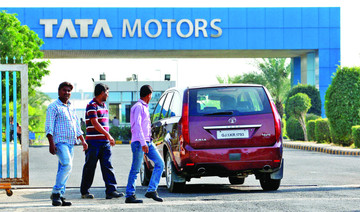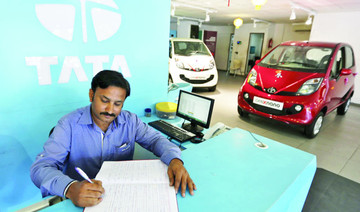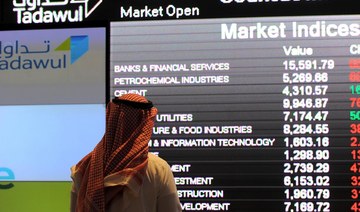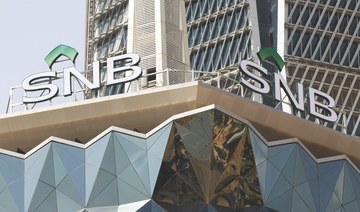NEW DELHI: India’s Tata Motors reported its first quarterly loss in nearly three years on Tuesday as its British unit Jaguar Land Rover sold fewer of its luxury cars to dealerships in China and expenses rose.
Dealers in China delayed purchases to benefit from an import duty cut that came into effect after the end of the quarter, the automaker said.
China decided to cut import tariffs for cars and car parts to 15 percent for most vehicles from 25 percent starting July 1, opening up greater access to the world’s largest auto market and helping to ease a recent flare-up in trade tensions with the United States. The move should in coming quarters provide a boost for overseas carmakers.
“We expect sales and financial results to improve over the remainder of the financial year ... with the new lower duties effective in China,” JLR CEO Ralf Speth said in Tata’s results statement.
Tata Motors’ Chief Financial Officer PB Balaji said headwinds facing JLR included its China sales levels as well as worries over Britain’s departure from the European Union and the diesel policy in Europe.
“China is probably the biggest one. We need to ensure China gets back to the growth rate that it was before the announcement of duty cuts,” Balaji told reporters.
In terms of Brexit, he said the company was preparing for worst-case scenarios, without elaborating, and was “gearing up for any eventuality that may be there.”
His comments came as the head of Britain’s car industry warned on Tuesday that if Britain were to leave the EU without a trade deal with the bloc that would raise costs and sow chaos for carmakers and consumers alike.
“Given these issues, we will remain focused on driving growth and simultaneously reducing costs and boosting operational efficiency and capability,” JLR’s Speth said.
Tata Motors reported a net loss of 19.02 billion rupees ($277 million) for its first quarter ended June 30, compared with a profit of 31.82 billion rupees a year earlier that included a 36.09 billion rupee gain from changes to the way JLR’s pension payments are calculated.
Even as JLR’s retail sales for the quarter rose 6 percent to 145,510 units helped by strong sales of its sport-utility vehicles — the Range Rover Velar and Jaguar E-Pace — quarterly revenue fell 6.7 percent because of lower wholesale orders.
The company reiterated its target of achieving between 4 percent and 7 percent growth in margins at JLR for the current fiscal year 2018-19.
Total expenses during the April-June quarter rose about 17 percent to 698.90 billion rupees.
To rein in costs, Tata Motors will restructure its business in Thailand. It plans to stop manufacturing vehicles in Thailand and will instead set up a distribution network to sell imported vehicles, Balaji said.
Tata Motors reported a quarterly profit of 11.88 billion rupees in its business in India excluding JLR, reversing a loss in the same period a year earlier and helped by higher sales of its passenger and commercial vehicles.
Tata Motors skids to first quarterly loss in three years
Tata Motors skids to first quarterly loss in three years

- India’s Tata Motors reported its first quarterly loss in nearly three years on Tuesday
- British unit Jaguar Land Rover sold fewer of its luxury cars to dealerships in China and expenses rose.
Japan keen to forge partnerships with Saudi Arabia in the field of IT, says minister
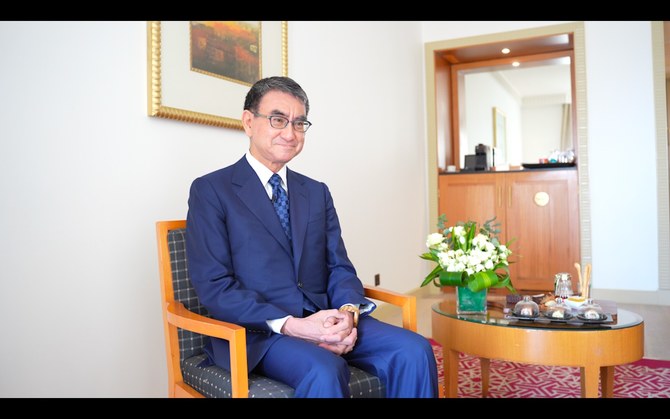
JEDDAH: Lauding Saudi Arabia’s efforts in developing giga-projects and the ongoing digital transformation in the country, a top Japanese official expressed his country’s willingness to strengthen collaboration with the Kingdom in the field of information technology.
Speaking to Arab News, Japanese Minister for Digital Transformation Taro Kono described his recent visit to one of the crown jewels of Vision 2030, NEOM, as truly remarkable.
The minister said that “he had the opportunity to fly over the project and witnessing it firsthand was truly remarkable.”
Since the launch of Vision 2030, Saudi Arabia has been in overdrive to diversify its economy away from oil and emerge as a hub of tourism, entertainment, technology, and renewable energy. On its road to transformation, the Kingdom is forging strategic partnerships with its global allies to achieve its target and work on mutually beneficial arrangements.
“I heard a lot about NEOM and The Line, I saw that the progress made was very impressive. And we heard the vision from the CEO. And it’s very convincing. So I was very glad that I came to NEOM this time. It was a very short (trip), but I think it was worth it,” the minister told Arab News.
NEOM, often referred to as the “city of the future,” is a $500-billion megacity project situated in the northwest region of Saudi Arabia. Encompassing 26,500 sq. km, the project aims to become a global leader in technology, innovation, and tourism through futuristic urban design and sustainable energy solutions.
Talking about Saudi Arabia’s demography, the minister said it is “a very young country” where the majority of the people are under the ages of 30-35. “And I see the Kingdom becoming more vibrant. And projects like NEOM” show that the country is moving swiftly moving forward.
Acknowledging the Kingdom’s success in adapting to the latest technologies, particularly related to cybersecurity, Kono praised the country’s leadership and its vision. He expressed his eagerness to forge a partnership with his Saudi counterpart to “learn from the Kingdom’s success.”
“I think the Kingdom is building up its resilience against any malicious attacks in cyberspace. So, I believe it is very ready to take a bold step forward. And I had a meeting with Saudi Minister of Communications and Information Technology Abdullah Al-Swaha and I think there’s a lot to learn from the Kingdom,” the Japanese minister said, adding that he had instructed his team to get in touch with their Saudi counterparts to learn from their approach.
Kono, however, stressed the need to develop non-English datasets to train artificial intelligence and proposed collaboration between Japan and Saudi Arabia in this regard.
While Japan has historically led in hardware technology, the minister admitted a lag in digital technology investment. Recognizing this gap, he signed a memorandum of cooperation with Al-Swaha to learn from Saudi Arabia’s IT advancements.
He said that although Japan excelled in analog technology during the 20th century, admittedly, they have fallen behind in investing in digital technology.
Their discussions reportedly included topics such as E-ID utilization, where Kono hopes to collaborate on developing mutual use cases to propel Japanese progress. He added: “I think the Kingdom and Japan could work together to advance in the field of IT software AI, so very much looking forward to that.”
With shared visions such as Vision 2030 and upcoming events like Expo 2025 in Osaka and Expo 2030 in Riyadh, the two countries have maintained a strong relationship for nearly seven decades.
Kono believes there is immense potential for collaboration between the two countries, particularly in joint projects for Expo 2025 in Osaka and Expo 2030 in Riyadh. “I am looking forward to continue working closely with the Kingdom,” he added.
Expo 2025 is scheduled to be held in Osaka, Japan. It will be held for 184 days This will be the third time for the Japanese city to host the event. Earlier Osaka hosted the global event in 1970 and then in 1990.
The theme for Expo 2025 is “Designing Future Society for Our Lives,” focusing on creating a better future through innovation and sustainability. The expo will provide a platform for countries to share their ideas and solutions to global challenges.
Expo 2030 is scheduled to be held in Riyadh. As the first World Expo to be hosted in the Middle East, it presents an opportunity for the region to showcase its cultural heritage, technological advancements, and vision for the future. The theme for Expo 2030 in Riyadh is “The Era of Change: Together for a Foresighted Tomorrow.” It is expected to align with Saudi Arabia’s Vision 2030 goals of diversifying the economy and promoting innovation.
Kono said: “When we had our expo in Osaka for the first time, I was probably seven or eight years old. But it gave us sort of a good, big push for the economy, or not just the economy, for society as well. Expo brings in a lot of our dreams, and dreams we had back then come true. So, this Expo 2025 will hopefully bring in another dream. And I hope it will make a bridge to 2030 and we (Saudi Arabia and Japan) can work together to make our dreams come true.”
Closing bell: Saudi main index rises to close at 12,373
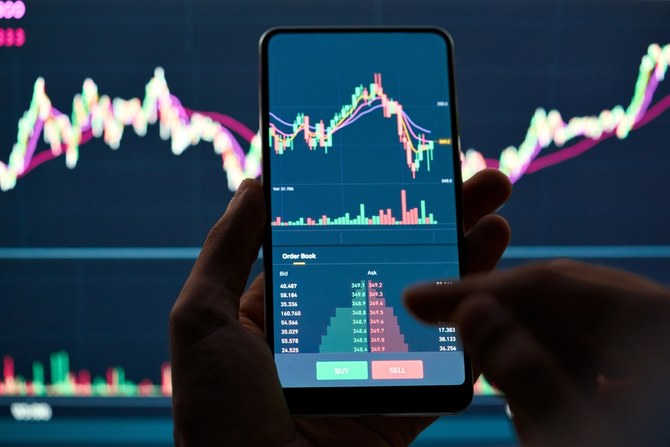
RIYADH: Saudi Arabia’s Tadawul All Share Index rose on Sunday, gaining 20.78 points, or 0.17 percent, to close at 12,373.11.
The total trading turnover of the benchmark index was SR5.26 billion ($1.4 billion) as 92 of the stocks advanced, while 129 retreated.
Similarly, the Kingdom’s parallel market Nomu also rose 332.34 points, or 1.26 percent, to close at 26,790.15. This comes as 27 of the stocks advanced, while as many as 31 retreated.
Meanwhile, the MSCI Tadawul Index jumped 4.56 points, or 0.29 percent, to close at 1,551.76.
The best-performing stock of the day was Zahrat Al Waha for Trading Co. whose share price surged 9.97 percent to SR47.45.
Other top performers include Raydan Food Co. as well as Saudi Cable Co.
The worst performer was Gulf Insurance Group whose share price dropped by 9.94 percent to SR34.90.
Other subdued performers included Al-Baha Investment and Development Co. as well as Salama Cooperative Insurance Co.
On the announcements front, Saudi Tadawul Group Holding Co. has announced its interim financial results for the period ending on March 31.
According to a Tadawul statement, the company’s net profit hit SR201.5 million in the first quarter of 2024, reflecting a 121 percent surge when compared to a similar quarter last year.
The increase was mainly driven by a rise in operating revenues, operating expenditures, and earnings per share as well as a climb in gross profit and operational profit.
Moreover, the National Agricultural Development Co. also announced its interim financial results for the first three months of 2024.
A bourse filing revealed that the firm’s net profit reached SR101.3 million by the period ending on March 31, up 168 percent in comparison to the corresponding period in 2023.
The increase in net profits is primarily attributed to a rise in revenue, a decrease in the cost of sales, and a reduction in finance costs, among other factors.
Furthermore, Gulf Insurance Group also announced its interim financial results for the first quarter of the year.
According to a Tadawul statement, the company reported a net loss of SR20.2 million, contrasting with a net profit of SR56.6 million in the same period of the previous year.
This loss is primarily attributed to a decrease in insurance revenue combined with adverse movement in reinsurance contracts.
Additionally, Saudi Aramco Base Oil Co., also known as Luberef, announced its interim financial results for the period ending on March 31.
A bourse filing revealed that the firm’s net profit stood at SR239 million at the end of the first quarter of 2024, reflecting a 46.3 percent drop when compared to the same quarter a year ago.
The decline in net profit for the current quarter compared to the same quarter of the previous year is attributed to a decrease in base oil crack margins.
Meanwhile, Saudi Cable Co. disclosed its annual financial results for the period ending on Dec. 31.
According to a Tadawul statement, the company reported a net profit of SR36.5 million in the first three months of 2024, a significant improvement from the net loss of SR584.9 million recorded in the corresponding period a year ago.
Saudi banks and capital market poised to drive Vision 2030 objectives: S&P Global
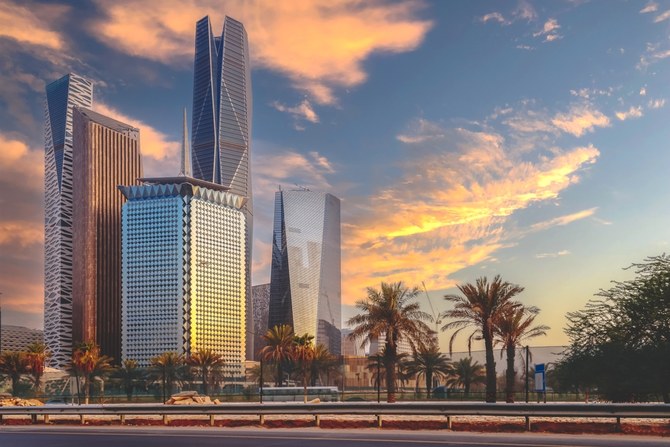
RIYADH: Saudi banks and the capital market are poised to make substantial contributions alongside the Public Investment Fund in achieving the objectives of Vision 2030, stated a report by S&P Global.
The latest analysis by the global rating agency underscores that their involvement in the Kingdom’s economic diversification endeavors will enhance leverage in both the Saudi private sector and the broader economy.
The report, citing public sources, indicated that the Saudi government’s transformation program aimed at enhancing the country’s economic, social, and cultural diversification will necessitate approximately $1 trillion in investments over several years.
“Part of this sum will come directly from the government and the Public Investment Fund, but S&P Global Ratings also expect banks and capital markets to contribute a significant amount,” stated the US-based agency in the report.
It added: “This will inevitably increase leverage in the Saudi private sector and the broader economy, albeit from low levels. The pace and extent of the increase in leverage in the corporate sector remain uncertain.”
As per the report, Saudi Arabia’s banking sector maintains a robust position, characterized by strong asset-quality indicators and overall capitalization.
The credit rating agency further anticipates that the banks’ sound profitability and conservative dividend payouts will persist, thereby bolstering their capitalization over the next one-to-two years.
S&P Global highlighted the expansion of the capital market in the Kingdom, noting that from January to May 2024, 13 private companies have announced potential listings on Saudi Arabia’s main market and parallel market.
The analysis projected that Saudi Arabia will experience a real gross domestic product growth of 2.2 percent in 2024 and 5 percent in 2025, with the non-oil private sector emerging as a key contributor to this expansion.
Earlier this month, S&P Global, in another report, noted that banks in Saudi Arabia are expected to pursue alternative funding options to manage the rapid expansion in lending.
The agency said that this pursuit of external funding could potentially impact the credit quality of Saudi Arabia’s banking sector.
“The ongoing financing needs of the Vision 2030 economic initiative and relatively sluggish deposits growth, is likely to incentivize banks to seek alternative sources of funding, including external funding,” said S&P Global.
Saudi Arabia posts budget deficit of $3.3bn in Q1 2024
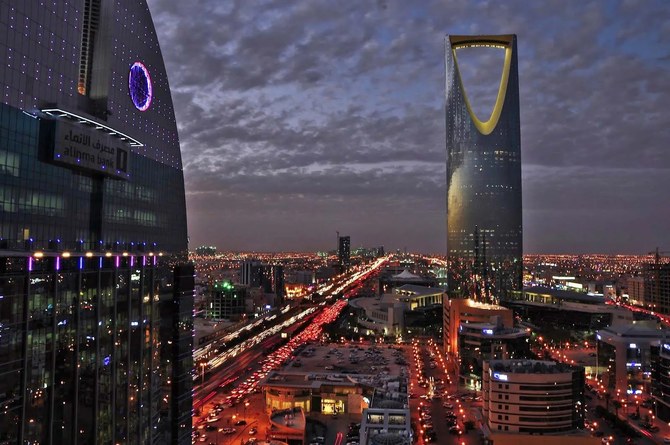
RIYADH: Saudi Arabia’s non-oil revenues rose by 9 percent to reach SR111.51 billion ($29.73 billion) in the first quarter of 2024 as compared to the same period in 2023, the Ministry of Finance said.
In its quarterly budget performance report, the ministry said the Kingdom posted total revenues of SR293.43 billion in the same quarter, while its public spending amounted to SR305.82 billion.
According to official data, total revenues increased 4 percent as compared to Q1 of 2023.
In the first quarter of the current year, the Kingdom posted a budget deficit of SR12.39 billion with oil revenues reaching SR181.92 billion.
The report added that oil revenues rose 1.9 percent as compared to the first quarter of 2023.
Taxes on good and services amounted to SR69.9 billion up 11 percent compared to the first quarter of 2023, it showed.
Taxes collected from international trade and transactions rose 10 percent to reach SR6.03 billion as compared to Q1 of the previous year.
The Kingdom allocated SR26.79 billion for municipal services in the first quarter of 2024, up 157 percent as compared to the same period in 2023.
The Kingdom’s public debt increased to nearly SR1.11 trillion in Q1 2024, from SR1.05 trillion by the end of 2023.
Saudi bank loans increase by 11% in March to hit $712bn, fueled by real estate activities
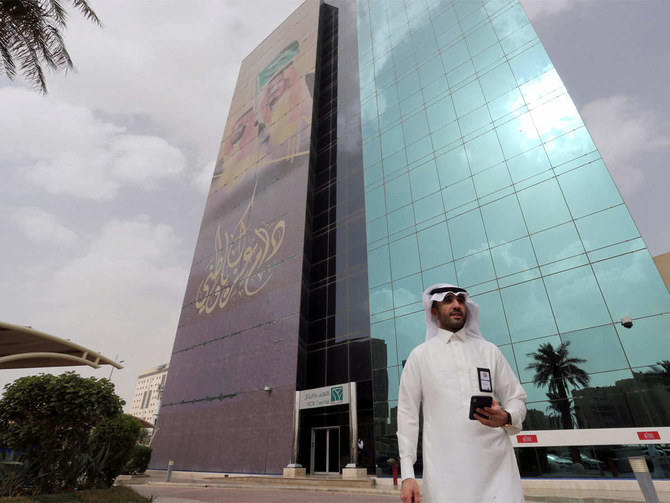
RIYADH: Saudi banks extended loans worth SR2.67 trillion ($711.5 billion) in March, marking an 11 percent increase as compared to the same month in 2023, according to the latest official data.
Figures released by the Saudi Central Bank, also known as SAMA, showed personal borrowings accounted for 35 percent of this growth, while the remaining 65 percent went to the corporate sector, particularly for real estate activities, as well as electricity, gas, and water supplies.
Real estate financing for corporate dealings specifically surged by 27 percent in the third month of the 2024, marking the highest annual growth rate in 10 months, reaching SR275.2 billion.
A study by Mortor Intelligence, which used 2023 as a base year, estimated the Kingdom’s real estate market at $69.51 billion in 2024, and expects it to reach $101.62 billion by 2029, growing at a compounded annual growth rate of 8 percent between 2024 and 2029.
The surge in real estate and construction endeavors may have heightened the need for debt-based financing primarily sourced from the local banking sector. Saudi banks play a central role in the provision of loans for real estate projects.
According to SAMA data, new retail residential mortgage loans experienced a notable increase, reaching a 14-month high at SR7.63 billion in March. This marked a 5 percent rise compared to the amount granted in the same month last year and a 10 percent increase from the previous month.
In March, lending for home purchases accounted for the largest portion, comprising 64 percent of new mortgages to individuals, totaling SR4.91 billion. The most notable growth, however, was observed in apartment loans, surging by 28 percent to reach SR2.24 billion. Meanwhile, land loans experienced a more modest growth of 4 percent, reaching SR474 million in new mortgages.
One factor contributing to this growth could be the need for residential properties from expatriates arriving in the Kingdom, along with government initiatives aimed at modernizing the financial system.
In a March study by Knight Frank, a notable trend emerged among expatriates, with 68 percent expressing a strong preference for owning an apartment rather than a villa. This inclination was especially prominent among individuals aged 35-45 and 45-55.
Growth in lending for electricity, gas and water supplies came as the second contributor in corporate loans after real estate, registering an annual rise of 27 percent to reach SR147.42 billion in March.
According to an April report by Global Data, the key sectors in the Saudi Arabia power market are the residential sector, commercial sector, industrial sector, and others. In 2023, the residential sector had the dominant share in the power consumption market.
The American International Trade Administration also stated in a January report that Saudi Arabia has experienced rapid economic and population growth since the discovery of oil. The population is projected to increase to 40.1 million by 2030.
Due to limited water resources, the country continues to invest in desalination facilities to meet rising water demands, aiming to deliver 2.18 billion cubic meters per year of desalinated water.
The Ministry of Environment, Water, and Agriculture has allocated $80 billion for water projects, with the wastewater treatment services market also expanding steadily according to the report. In 2021, Saudi Arabia built 133 wastewater treatment facilities, marking a 14.66 percent increase from the previous year.
SAMA data also revealed that financing for professional, scientific, and technical activities soared by 54 percent, hitting SR6.4 billion, marking the highest annual growth rate among sectors.
Education loans also showed robust growth, with an annual increase of 28 percent to reach SR6.27 billion. Additionally, financing for administrative and support service activities rose by 20 percent, totaling around SR34.22 billion.
While the proportion of lending allocated to the scientific and education sectors may currently be modest, the Saudi government acknowledges their pivotal significance in driving the Kingdom’s comprehensive transformation agenda.
Recognizing the paramount importance of innovation and fostering a culture of scientific inquiry, the government has implemented diverse initiatives aimed at nurturing these sectors.
These efforts are believed to have played a part in the gradual increase in lending support extended to these sectors by financial institutions. As the Kingdom continues to prioritize knowledge-based industries and endeavors, further advancements and investments in these areas are anticipated to amplify, propelling the nation towards its ambitious developmental goals.


